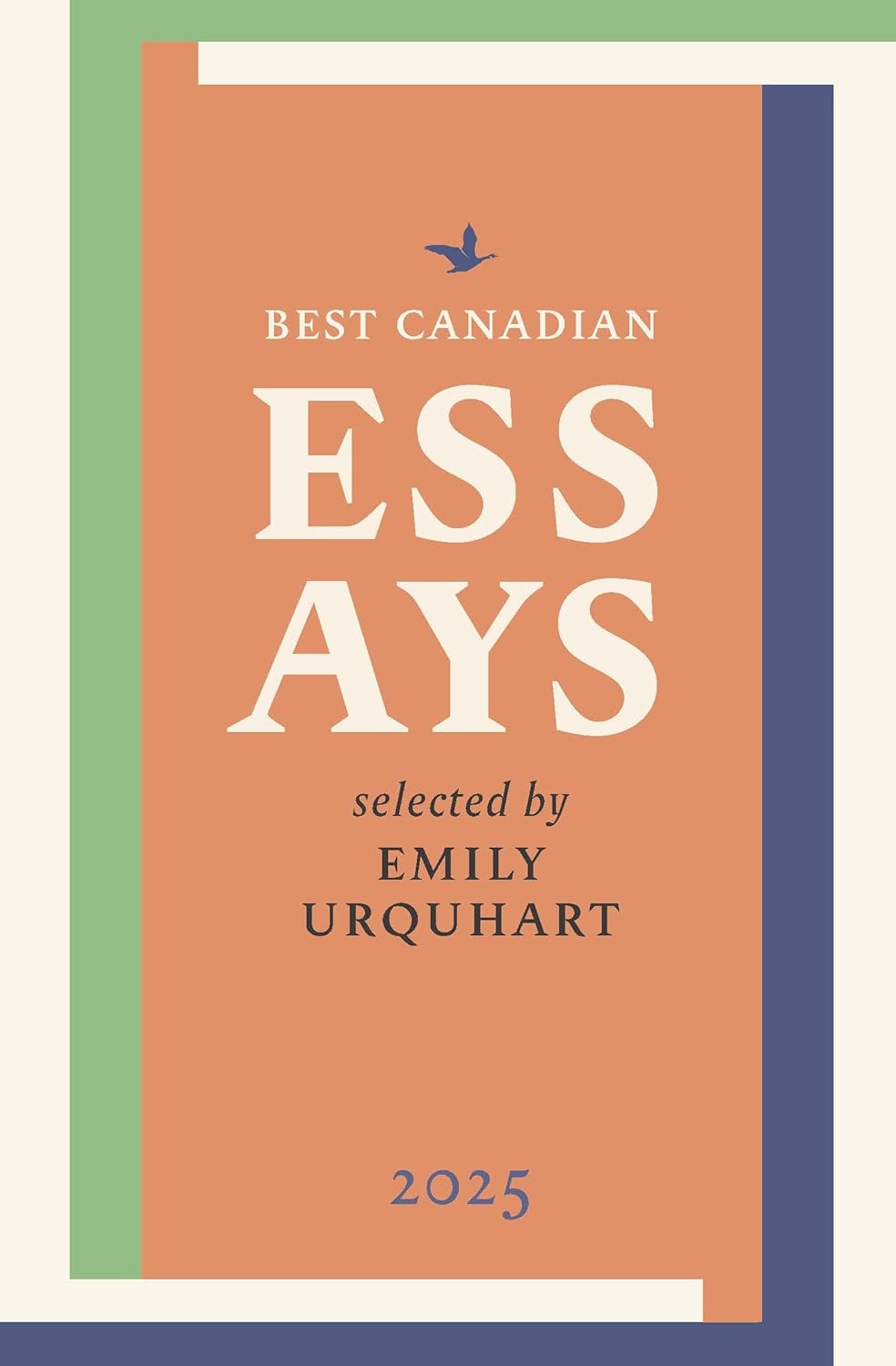Best Canadian Essays 2025, Edited by Emily Urquhart
Reviewed by Michael Greenstein
Sometimes an essay strives to be poetry, sometimes a short story; such is the case with many of the selections in Emily Urquhart’s collection, Best Canadian Essays 2025. Accordingly, in her “Introduction” she quotes from Robert Penn Warren’s long poem “Audubon: A Vision”: “Tell me a story / In this century, and moment, of mania / Tell me a story.” These lines point to a lyrical and narrative presence in these essays that occasionally blur the boundaries between genres. For Urquhart the main criteria are the writer’s delivery, keen observation, surprising turn, inventive language, and emotional appeal.
Helen Humphrey’s “The Boiler Room” opens the volume with her memory of kissing her elderly janitor, E., in her high school’s eponymous boiler room, and ends with her realization that those repeated adventures trespass the bounds of behaviour. Just as she realizes that her actions were objectionable, so she flips genres out of the essay: “When I am writing a novel, I sometimes try and think of one true thing that is at the heart of the story, a thing that will remain true no matter how I turn it …. So, when I turn this story of myself and E., what is the one true thing in it?” One truth of an essay may be its turn to fiction where it may turn into a short story.
Jiin Kim’s “Complementary, Free of Charge” begins in short story territory: “Ueta-san had the excellent posture and the slightly raised shoulders of many short men.” This essay takes place in a Swiss Chalet where an immigrant family fails to understand the menu and manner of eating some of the dishes. The title refers to a bowl of lemon water used for cleaning hands after the meal.
Lana Hall examines a massage parlour instead of a boiler room in “We Are All Animals at Night,” which also includes the sex trade. She concludes: “But I know the stories of the city after dark, and I keep those with me, always.” Ariel Gordon’s “Rotten” combines cervical testing and tree infections. Vance Wright’s “Birth Stories, Adoption, and Myths” brackets story within essay to parallel the experiences of an adopted child: “Narratively, a birth comes either at the beginning or end of a story,” as if narrative and post-natal trauma were intertwined. “Adoption is a process, an experience, a practice, that resists neat narratives, genres, and stable categorizations.”
Similarly, James Cairns’s “My Struggle and ‘My Struggle’” embeds story within the meta-essay: “Today, I shake my head while recalling the self-narrative I performed at that time because so much of it consisted of lies.” Rebecca Kempe recounts the experience of being Black in “The ‘Beauty’ of My Existence”: “I feel like people expect a narrative I simply can’t provide.” In “Found” Sadiqa de Meijer loses her notebook and calls upon Agnes Varda’s film, “The Gleaners and I” for guidance. Near the end of the film Varda acknowledges the metaphoric gleaning that she does with her camera – “I understood that my notebook was also a gleanings container.” The essayist gleans from life and learns from her young daughter’s attempts at writing: “So the first writing is recursive; momentarily, it tricks the endless forward line and circles back.” Strange and familiar loops work through essays of the mind’s gleanings.
Tom Rachman resorts to the same frame in “Confessions of a Literary Schlub”: “To attract coverage, you need a narrative behind the narrative.” In “Shadow Face” Jessica Moore mixes life and literature with her twins and a host of authors ranging from Tomas Tranströmer to Elena Ferrantes, Sherry Simon, and Anne Carson. Christine Lai collects postcards in “Now Must Say Goodbye.” Leanne Simpson creates a poetic dialogue between herself and a mysterious spiritual presence in “The Beauty Lands.” Mitchell Consky describes his experience at a summer camp for children who have lost a parent. Katherine Ashenburg’s “How We Say Goodbye” closes the volume on an elegiac note with her distinction between grieving and mourning for her friend Anne Kingston.
About the Author
Emily Urquhart is the author of three books of nonfiction, including the essay collection, Ordinary Wonder Tales, a finalist for the 2023 Hilary Weston Writers’ Trust Prize for Nonfiction. She has a background in journalism and a doctorate in folklore, and draws on both in her writing. She is a five-time National Magazine Award nominee for her journalistic work, and has won gold and silver. She lives in Kitchener, Ontario with her husband and two children, where she is a nonfiction editor for The New Quarterly and teaches creative writing and science communication at the University of Waterloo.
About the Reviewer
Michael Greenstein is a retired professor of English (Université de Sherbrooke). He is the author of Third Solitudes: Tradition and Discontinuity in Jewish-Canadian Literature and has published widely on Victorian, Canadian, and American-Jewish literature.
He has published 250 essays and reviews in books and journals across Canada, the United States, and Europe.
Book Details
Publisher : Biblioasis
Publication date : Nov. 12 2024
Language : English
Print length : 152 pages
ISBN-10 : 177196636X
ISBN-13 : 978-1771966368




